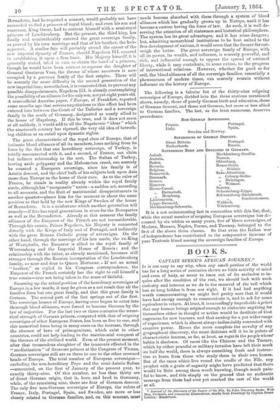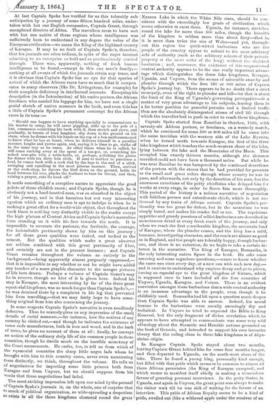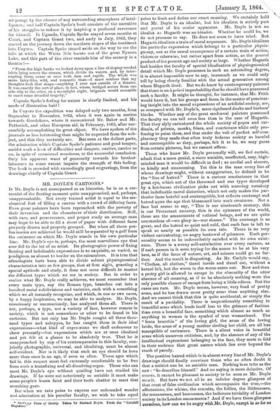BOOKS.
CAPTAIN SPEKE'S AFRICAN JOURNEY.* IT is not easy to say why, when any small portion of the world has for a long series of centuries shown so little activity of mind and even of body, as never to issue out of its seclusion to in- quire after the condition of the rest, we should look with such curiosity and interest as we do to the removal of the veil which has so long hidden it from our sight. If it had had anything worth communicating we might feel pretty sure that it would have had energy enough to communicate it, and to ask for some equivalent in return. At least, it is exceedingly improbable &priori that any human beings original enough to elaborate anything for themselves either in thought or action would be destitute of that eagerness for new learners, and that anxiety for a yet wider range of experience, which is almost always indissolubly connected with creative power. Hence the more complete the novelty of any geographical discovery, the more deficient will it be in points of characteristic interest, so far, at least, as regards the people whose' habits it discloses. Of races like the Chinese and the Tartars, which by either peaceful or military invasion have left their mark on half the world, there is always something fresh and instruc- tive to learn from those who study them in their own homes. But of the races which live round the cradle of the Nile, any prophet with a grain of sagacity might have predicted that there would be little among them worth knowing, though much pain- ful to know, and this simply on the ground that no authentic message from them had ever yet reached the rest of the world at all.
* Journal of the Discovery of the Source of the Nile. By John Manning Spoke. With Map, Portraits, and numerous Illustrations, chiefly from Drawings by Captain Grant. London: Blackwood.
At last Captain Speke has verified for us this tolerably safe anticipation by a journey of some fifteen hundred miles, under- taken with but one English companion, Captain Grant, through unexplored districts of Africa. The travellers seem to have met with but one native of those regions whose intelligence was sufficiently keen to understand in any degree the value of the European civilization—we mean the King of the highland country of Karague. It may be no fault of Captain Speke's, therefore, that his journals are often tedious, in spite of the eager interest attaching to an enterprise so bold and so pertinaciously carried through. There was, apparently, nothing of fresh human intelligence to be found,—except in this one man's family,— nothing at all events of which the journals retain any trace, and it is obvious that Captain Speke has no eye for that species of naiveté of which the African races have so much that it compen sates to many observers (like Dr. Livingstone, for example) for their complete deficiency in intellectual interests. Excepting his description (in the Introduction) of his native porters, the African freedmen who carried his luggage for him, we have not a single genial sketch of native manners in the book, and even this has a little of Captain Speke's permanent contempt for the African races in its tone :-
"Should one happen to have anything specially to communicate to his master in camp, he will enter giggling, sidle up to the pole of a hut, commence scratching his back with it, then stretch and yawn, and gradually, in bursts of loud laughter, slip down to the ground on his stern, when he drums with his hands on the top of a box until summoned to know what he has at heart, when he delivers himself in a peculiar manner, laughs and yawns again, and, saying it is time to go, walks off in the same way as he came. At other times when he is called, he will come sacking away at the spout of a tea-pot, or, scratching his naked arm-pits with a table-knife, or, perhaps, polishing the plates for dinner with his dirty loin cloth. If sent to market to purchase a fowl, he comes back with a cock tied by the legs to the end of a stick, swinging and squalling in the most piteous manner. Then, arrived at the cook-shop, he throws the bird down on the ground, holds its head between his toes, plucks the feathers to bare its throat, and then, raising a prayer, cuts its head off."
In some respects Captain Speke's narrative is even needlessly defective. Thus he scarcely gives us any impression of the small details of social manners,--for instance, how the natives of any country he visited eat,—and though he indicates the existence of some rude manufactures, both in iron and wood, and in the bark of trees, he gives no account of them at all ; finally, he conveys no notion of the ordinary daily life of the common people in these countries, though he dwells much on the horrible monotony of the Court amusements. He omits, too, to tell us from which of the equatorial countries the sharp little negro lads whom be brought with him to this country came, never even mentioning them distinctly, we think, throughout the volume. He tells us of negotiations for importing some little princes both from Karague and from Unyoro, but we should suppose from his words that these negotiations had failed.
The most striking impression left upon our mind bythe perusal of Captain Speke's journals is, on the whole, one of surprise that so much of political organization, so wide-spreading a despotism as exists in all the three kingdoms clustered round the great Nyanza Lake in which the White Nile rises, should be con- ' sistent with the exceedingly low grade of civilization which seems otherwise to exist there. Uganda, for instance, stretches round the lake for more than 300 miles, though the breadth of the kingdom is seldom more than about forty—that is, it is more than twice the size of Wales—and yet, through- out this region the quick-witted barbarians who are the people of the country appear to submit to the most arbitrary acts of authority (such as the arbitrary seizure of their private property at the mere order of the king) without the slightest hesitation ; and, moreover, the existence of this unquestioned central authority appears to be the one really important advan- tage which distinguishes the three lake kingdoms, Karague, Uganda, and Unyoro, from the scenes of miserable anarchy and plunder through which the first 700 or 800 miles of Captain Speke's journey lay. There appears to be no doubt that a strict monopoly, even of the right to plunder and kill—for that is about the limit of the King of Uganda's governing prerogative—is a matter of very great advantage to his subjects, leaving them in a far better position for peaceful pursuits and a limited traffic than are the absolutely disintegrated atoms of civil life through which the traveller had to push in order to reach these kingdoms.
Captain Spoke started from Zanzibar in October, 1860, with seventy-six African porters, or freedmen, on a westerly march, which he continued for some 500 or 600 miles till he came into the same meridian with the western side of the Lake Nyanza, when he turned north towards Karague, the first of the three lake kingdoms which touches the south-western shore of the lake, lying between the lake and the Mountains of the Moon. This occupied him exactly thirteen months, although the distance travelled could not have been a thousand miles. But while ho was near Zanzibar he was hampered by the continued desertions of the porters with the stores that he had provided for presents to the small and great rulers through whose country he was to pass, and afterwards, not only by the desertion of his men, but the enormous extortions of the petty chieftains who delayed him fer weeks at every stage, in order to fleece him more thoroughly. This period of the history is a tedious narrative of negotiation with faithless porters and extortionate chiefs, which is not en- livened by any traits of African naïveté. Captain Speke's per- tinacity was too great for defeat, but in the meantime lie was simply bored, and makes his reader feel so too. The capricious appetites and greedy passions of selfish barbarians are described in monotonous detail at every fresh reach of the journey, and only when we reach the first considerable kingdom, the mountain land of Karague, where the plunder ceases, and the king has a mild, humane, investigating character, and the roads are almost as good as in England, and the people are tolerably happy, though barbar- ous, and there is no extortion, do we begin to take a certain in- terest in the narrative. The King of Karague, Rumanika, is the only interesting native figure in the book. He asks some amusing and some sagacious questions,—wants to know whether the same sun rises every day, or a new sun with each new day,— and is anxious to understand why empires decay and go to pieces, having an especial eye to the great kingdom of Kittara, which is supposed once to have included all the four countries of Unyoro, Uganda, Karague, and Usinza. There is an evident conviction amongst these barbarians that a wide central authority is an immense advantage to the people, even though it be childishly used. Rumanika had hit upon a question much deeper than Captain Speke was able to answer. Indeed, his moral lessons to the barbarians were usually amusingly dry and technical. In Unyoro be tried to expound the Bible to King Kamrasi, but the only fragment of divine revelation which he appears to have attempted to communicate was some very wild ethnology about the Shemitic and Hamitic nations grounded on the book of Genesis, and intended to support his own favourite theory that the ruling class in these lake kingdoms is of Abys- sinian origin.
In Karague Captain Spoke stayed about two months, leaving Captain Grant behind him for some four months longer, and then departed to Uganda, on the north-west shore of the lake. There he found a young king, personally kind enough, but filled with that pride which seems to be common to almost all these African potentates (the King of Karague excepted), and which seems to manifest itself chiefly in making a tremendous favour of granting personal interviews. In the petty States, in Uganda, and again in Unyoro, the great point was always to make the visitor wait till he was sick of waiting for the favour of an interview. This pride of African Royalty seems to be a kind of pride, swelled out (like a withered apple under the receiver of an air pump) by the absence of any surrounding atmosphere of intel- ligence; and half Captain Spoke's book consists of the narrative
of his struggles to reduce it by inspiring a profound reverence for himself. In Uganda, Captain Speke stayed seven months at Court, and Captain Grant two, and early in July, 1862, they started on the journey down the northern slopes of the continent into Unyoro. Captain Speke turned aside on the way to see the fulls at which the White Nile bursts out of the great Nyanza
Lake, and this part of the river reminds him of the scenery in a theatre !— " From the high banks we looked down upon a line of sloping wooded islets lying across the stream, which divide its waters. and, by inter- rupting them, cause at once both dam and rapids. The whole was more fairy-like, wild, and romantic than—I must confess that my thoughts took that shape—anything I ever saw outside of a theatre. It was exactly the sort of place, in fact, where, bridged across from one side-slip to the other, on a moonlight nights brigands would assemble to enact some dreadful tragedy."
Captain Speke's feeling for nature is clearly limited, and his mode of illustration bald I In Unyoro the expedition was delayed only two months, from September to November, 1862, when it was again in motion towards Gondokoro, where it encountered Mr. Baker and Mr.
Petherick, and other European aid, in February, 1863, after suc- cessfully accomplishing its great object. We have spoken of the journals as less interesting than might be expected from the sub- ject, and this they certainly are. But even at the dullest parts,
the admiration which Captain Speke's patience and good temper, amidst such a host of difficulties and dangers, excites, carries us on, in spite of occasional weariness, to the successful conclusion.
Only his apparent want of generosity towards his brother- labourers to some extent impairs the strength of this feeling.
The book is crowded with exceedingly good engravings, from the drawings chiefly of Captain Grant.


















































 Previous page
Previous page